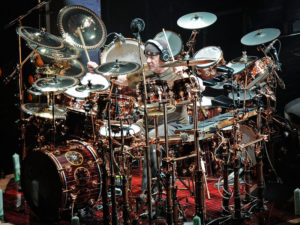The Professor
Rush Drummer Neil Peart died on January 7th at the age of 67.
“Peart’s love of literature and reverence for history deeply informed his songwriting. “Red Sector A,” for example, emerged after he read accounts of World War II concentration camp survivors. “Manhattan Project” addresses the U.S. dropping atomic bombs on Japan in 1945, from multiple viewpoints. For much of Rush’s career, Peart was also dogged by long-ago praise for the author Ayn Rand, whose works were an influence on the sprawling 1976 song cycle 2112. (He later clarified that Rand’s work no longer resonated with him.)
In a 2015 Rolling Stone cover story, Peart self-described as a “bleeding-heart libertarian.”And, above all, his lyrics made people think — Rush fans were liberal, conservative, religious, non-religious — but they all united around their respect for the band and their admiration for how Neil could articulate their experiences, or give them a new way to look at an issue.”
In no small part because of his erudition, Peart’s erudition earned him the nickname “The Professor.” It was apt: Carrying himself with an air of well-spoken authority, he possessed knowledge about a variety of topics, owing to his extensive global travels — on Rush tours, he was known for taking off on bicycle rides and, later, would hop on his motorcycle to travel between gigs — and a voracious curiosity about the world around him. In his 2002 book, Ghost Rider: Travels on the Healing Road, he described going to art museums in the afternoons before Rush concerts “to feed my growing interest in paintings, art history, and African carvings.”
While an interesting travelogue, at its root Ghost Rider was a chronicle of how to repair a shattered self. The book details how Peart embarked on a solo motorcycle trek “to try to figure out what kind of person I was going to be, and what kind of world I was going to live in” after his 19-year-old daughter, Selena, died in a 1997 car crash, and his wife Jackie passed due to cancer the following year.
All told, Peart released seven nonfiction books, several fiction collaborations and poured out thousands more words via his personal website. “What made Neil such a good writer is how much he loved to read,” Halper says. “He really loved and respected books. He loved good literature — he and I sat around one night talking Shakespeare — he loved poetry, he loved philosophy. He valued good conversation. He was a thinker — in the truest sense of the word.”
As any Rush fan will share, air-drumming to 1981’s “Tom Sawyer” can be one of life’s greatest pleasures.
[Excerpt from ‘Remembering Neil Peart, A Monster Drummer With A Poet’s Heart’, by NPR’s Annie Zaleski.]
A favorite quote from Bob Dylan, taken from a 1978 Rolling Stone interview: “The highest purpose of art is to inspire. What else can you do for anyone but inspire them?”
Rush was inducted into the Rock & Roll Hall of Fame in 2013.

Leave a Reply